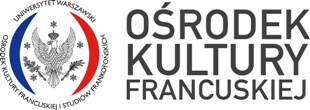Wtorek geopolityczny 19/10/2021

Ośrodek Kultury Francuskiej i Studiów Frankofońskich UW, Wydział Nauk Politycznych i Studiów Międzynarodowych UW oraz Polskie Towarzystwo Studiów Międzynarodowych we współpracy z Groupe d’études géopolitiques zapraszają na spotkanie z cyklu WTORKI GEOPOLITYCZNE.
The European Handbook of Central Asian Studies: History, Politics and Societies
prof. Adrien Fauve (French Institute for Central Asian Studies)
19.10.2021 wtorek
godz. 15.00-16.30
Sala nr 210, ul. Nowy Świat 69
On-line : https://us02web.zoom.us/j/82755340851
Spotkanie w języku angielskim.
Informujemy, że spotkanie jest rejestrowane. Nagranie będzie wykorzystane w celach naukowych. Udział w spotkaniu jest równoznaczny z wyrażeniem zgody.
Prosimy o przestrzeganie zaleceń sanitarnych obowiązujących na UW.
Adrien Fauve is Director of IFEAC (French Institute for Central Asian Studies – Bishkek) and Assistant Professor of Politics and International Relations at Paris-Saclay University. Previously, he was a post-doctoral fellow at CNRS (2016-2017) and within Bruno Latour’s FORCCAST project on active learning (2013-2016). For seven years, he has coordinated the Central Asia seminar series at CERI-Sciences Po with Karlygash Abiyeva, Olga Spaiser, Bayram Balci, and Olivier Ferrando (2010-2017). His research focuses on political sociology and international relations, with fieldworks in Central Asia. Recent publications include articles in the Nationalities Papers, Central Asian Survey, and Revue d’Etudes Comparatives Est-Ouest.
Jeroen Van den Bosch; Adrien Fauve; Bruno De Cordier (eds.), European Handbook of Central Asian Studies: History, Politics, and Societies, (Stuttgart: ibidem Verlag, 2021)
Open Access: https://eiscas.eu/handbook/download/
This handbook is the first collection of comprehensive teaching materials for teachers and students of Central Asian Studies (CAS) with a strong pedagogic dimension. It presents 22 chapters, clustered around five themes, with contributions from more than 19 scholars, all leading experts in the field of CAS and Eurasian Studies. This collection is not only a reference work for scholars branching out to different disciplines of CAS but also for scholars from other disciplines broadening their scope to CAS. It addresses post-colonial frameworks and also untangles topics from their ‘Soviet’ reference frame. It aims to de-exoticize the region and draws parallels to European or to historically European-occupied territories. In each chapter, the handbook provides a concise but nuanced overview of the topics covered, in which way these have been approached by the mainstream literature, and points out pitfalls, myths, and new insights, providing background knowledge about Central Asia to readers and intertwine this with an advanced level of insight to leave the readers equipped with a strong foundation to approach more specialized sources either in classroom settings or by self-study. In addition, the book offers a comprehensive glossary, list of used abbreviations, overview of intended learning outcomes, and a smart index (distinguishing between names, locations, concepts, and events). A list of recorded lectures to be found on YouTube will accompany the handbook either as instruction materials for teachers or visual aids for students. Since the authors themselves recorded the lectures related to their own chapters, this provides the opportunity to engage in a more personalized way with the authors. This project is being developed in the framework of the EISCAS project (www.eiscas.eu), co-funded by the Erasmus + Program of the European Union.